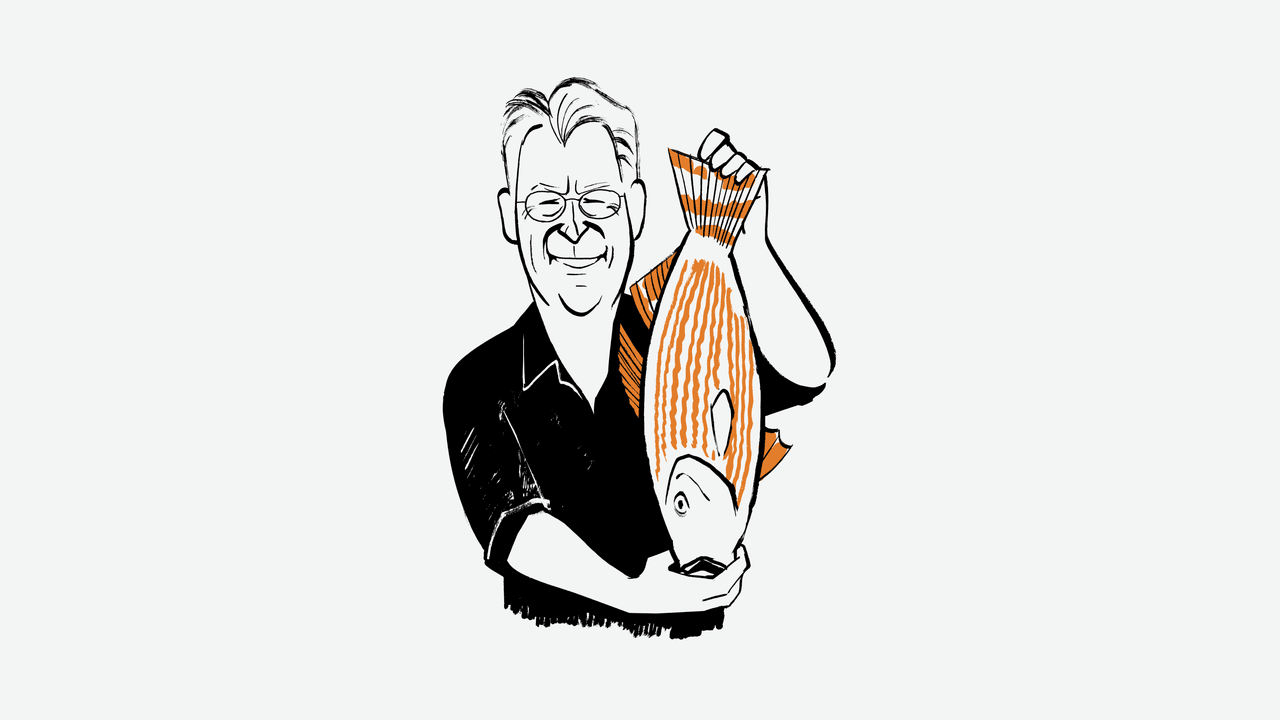Unless you’ve been living under a rock submerged in Norway’s Alta River and have gills, you probably missed the news announced in a press-release-style note last month. “Largest Atlantic Salmon Landed in 2025,” the headline read. Underneath, the note elaborated that “250 miles inside of the Arctic Circle at around two o’clock in the morning with a still tall midnight sun overhead, Edward L. Shugrue III feels a slight touch at the end of his fly-line.” The toucher: a fifty-two-pound Atlantic salmon, one of the largest ever caught. The touchee: Shugrue, a fifty-nine-year-old mutual-fund guy.
The correspondent? “I wrote it,” Shugrue said recently, in the living room of his apartment on Park Avenue. “It took, like, a week to process, but I was flying home and I thought, Holy Christ, this is a real fucking fish.” You catch the big fish so you can talk about catching the big fish. Shugrue, who had mostly white hair and a salmon-colored shirt (unintentional), was telling the tale before a plate of smoked striper from his fishmonger in Amagansett. “I thought about serving salmon because we’re talking about salmon, but I really can’t do it,” he said.
To fish the Alta, which has some of the biggest salmon in the world, you need a “rod.” Shugrue’s rod grants him angling rights for a section of river for six days every year. Fewer than a hundred rods exist. “They’re handed down, father to son,” Shugrue said. “I’ve heard stories—wealthy, keen anglers—letting it be known, ‘Hey, I’d pay a million bucks for a rod.’ Actual numbers today, it’s like buying into a golf club.” Shugrue bought his, in 2019, from an heirless angler friend. (There’s also a public lottery.)
The Alta was hot this year. The week before Shugrue arrived, a forty-pounder was caught by a Russian oligarch. “He’s what I would call a good oligarch,” Shugrue said. “Big salmon conservationist.” Shugrue had invited his friend Tiggy Pettifer. She was the assistant to Prince Charles and a companion to William and Harry. Shugrue felt the slight touch on the first day. He got a piece of string to demonstrate. “You’re the angler, and I’m the fish,” he said. He touched the string slightly. Afterward, the fish took off. Two boatmen, rowing a wooden canoe, chased it a mile downstream. Thirty minutes later, Shugrue had his fish.
Pettifer took photos of Shugrue and the two boatmen. “I love Tiggy to death, but most people make a small fish look big,” Shugrue said. “She made a big fish look small. But, if you look at my hand, you see the girth is absurd. It’s a twenty-nine-inch girth. What’s Kate Moss? Twenty?” They let the fish go.
Shugrue and Pettifer met several years ago, at a dinner for the Atlantic Salmon Trust, a conservation group. “Tiggy was my tablemate,” Shugrue said. “I had a very good seat. It was me, Tiggy, Prince Charles, George Percy, who will be the next Duke of Northumberland, and to his left was King Harald of Norway.” He learned that he and Harald used the same boatmen. “There was no question at the time, King Harald was the king at the table. Very regal bearing. Now, mind you, I think he has an easier job. If you had to be king, I’d take King of Norway. Charles—this is the thing I couldn’t get out of my head—he’s really got sportsmen’s hands. He is not a dandy. Calloused, rough hands. He has a real love of salmon.”
Shugrue wrote about his encounters with royalty and other big fish in a memoir. It’s twelve chapters, structured by month: St. Barts in January, European sailing regattas in September, bird shooting in November. July is for salmon, his favorite. There are some sociological observations. “The vast amount of douchebags that you see along the journey,” Shugrue said. “You know, guys who speak with lockjaw and make you feel like an asshole.” He provides advice on avoiding douchbaggery. “A little PJ (Private Jet) etiquette,” he writes. “Bring a few great snacks (caviar, Champagne, pre-poured bloodies, etc.) and a nice gift like an Hermès cashmere blanket for when it gets chilly on board.” The book was a COVID project, unpublished. “My wife said, ‘Darling, I love you, and I think you are a decent writer, but I really don’t want to read seventeen pages about salmon.’ ”
The salmon is a pretty great fish. It lives in saltwater and in fresh. It jumps twelve-foot dams. It travels thousands of miles across the ocean to find its ancestral river and spawns within feet of where it hatched. “Sadly, everybody wants to kill the salmon,” Shugrue said. “It has too many enemies.” Poachers, farmed-fish effluent (“You’re, like, ‘How do fish shit this much?’ ”), global warming, the demand of the seafood-eating public. “And then, of course, sharks and other things want to eat them, too,” Shugrue said. Who will be the salmon’s friend? “For right or wrong, wild-salmon fishing is seen as a pretty one-per-cent, élitist kind of thing,” Shugrue said. “It’s, like, ‘I’m saving all these wild salmon so rich guys can catch them?’ ” ♦
